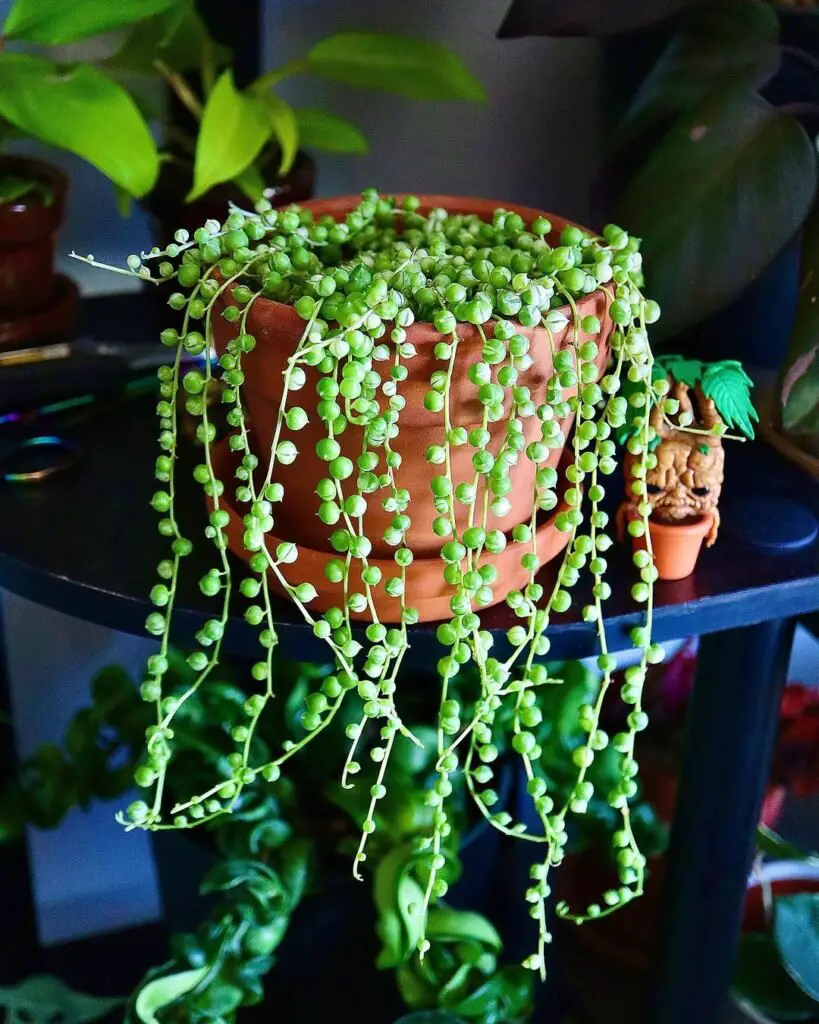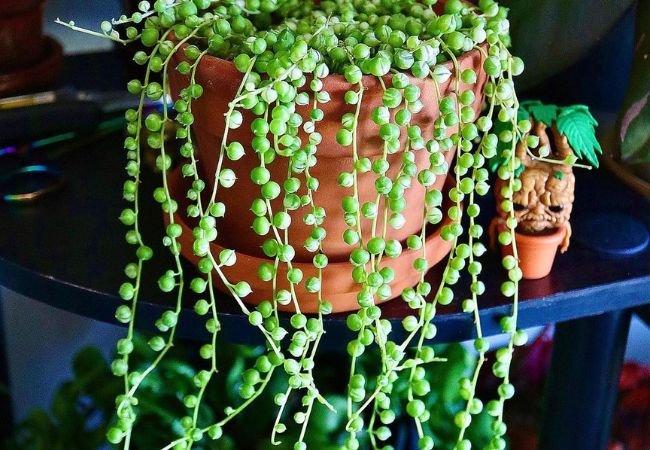Learn how to propagate Senecio rowleyanus, also known as String of Pearls. Discover step-by-step methods, care tips and troubleshooting for successful propagation of this unique succulent.
Senecio rowleyanus, commonly known as String of Pearls, is a unique and attractive succulent known for its cascading stems of bead-like leaves. Propagating this plant is relatively easy and can be a rewarding experience for plant enthusiasts. This guide will walk you through the process of propagating String of Pearls and caring for the new plants.
Understanding Senecio rowleyanus

Before we dive into propagation, let’s briefly cover some key facts about String of Pearls:
- Native to southwest Africa
- Trailing succulent with spherical leaves
- Ideal for hanging baskets or as a ground cover
- Prefers bright, indirect light
- Drought-tolerant
Learn more about String of Pearls care
Methods of Propagation
There are two main methods to propagate String of Pearls:
- Stem Cuttings
- Division
We’ll focus on stem cuttings as it’s the most common and easiest method.
Propagating String of Pearls from Stem Cuttings
What You’ll Need:
- Healthy parent plant
- Clean, sharp scissors or pruning shears
- Well-draining potting mix for succulents
- Small pots with drainage holes
- Rooting hormone (optional)
Steps:
- Choose a healthy stem with several pearls (leaves).
- Cut a 4-6 inch section of the stem, ensuring it has at least 5-6 pearls.
- Remove the pearls from the bottom 2 inches of the stem.
- Allow the cutting to dry and callus for 24-48 hours.
- (Optional) Dip the cut end in rooting hormone.
- Plant the cutting in well-draining succulent soil.
- Water lightly and place in a bright, indirect light location.
Detailed guide on succulent propagation techniques
Caring for Your Propagated String of Pearls
Watering
- Allow soil to dry completely between waterings
- Water sparingly, especially until roots develop
Light
- Bright, indirect light is ideal
- Protect from harsh afternoon sun
Soil and Fertilizer
- Use well-draining succulent or cactus mix
- Fertilize sparingly with a balanced, water-soluble fertilizer during growing season
Temperature and Humidity
- Prefers temperatures between 70-80°F (21-27°C)
- Can tolerate lower temperatures, but protect from frost
- Enjoys moderate humidity but adapts to drier conditions
Common Problems and Solutions
- Rotting stems
- Cause: Overwatering or poor drainage
- Solution: Reduce watering and ensure proper drainage
- Shriveling pearls
- Cause: Underwatering or too much direct sunlight
- Solution: Increase watering frequency and move to a location with bright, indirect light
- Slow growth
- Cause: Insufficient light or nutrients
- Solution: Provide more light and consider light fertilization
Troubleshooting guide for succulent problems
Tips for Successful Propagation
- Use clean tools to prevent disease transmission
- Be patient – root development can take several weeks
- Mist the soil surface instead of watering deeply until roots establish
- Avoid fertilizing new cuttings for the first few months
Displaying Your String of Pearls
Once your propagated plants have established, consider these display ideas:
- Hanging baskets
- Trailing over the edges of bookshelves
- As a living curtain in front of a bright window
- In a terrarium with other small succulents
Creative ideas for displaying String of Pearls
Propagating Senecio rowleyanus (String of Pearls) is a straightforward process that allows you to multiply your plant collection or share with friends. By following these steps and providing proper care, you can successfully grow new String of Pearls plants. Remember, patience is key in plant propagation. With time and attention, your new plants will thrive and add a unique touch to your indoor or outdoor spaces.
Explore more about succulent care and propagation
For more gardening tips and plant care guides, visit usagardenhub.com.


1 thought on “Propagating String of Pearls (Senecio rowleyanus) : A Complete Guide”